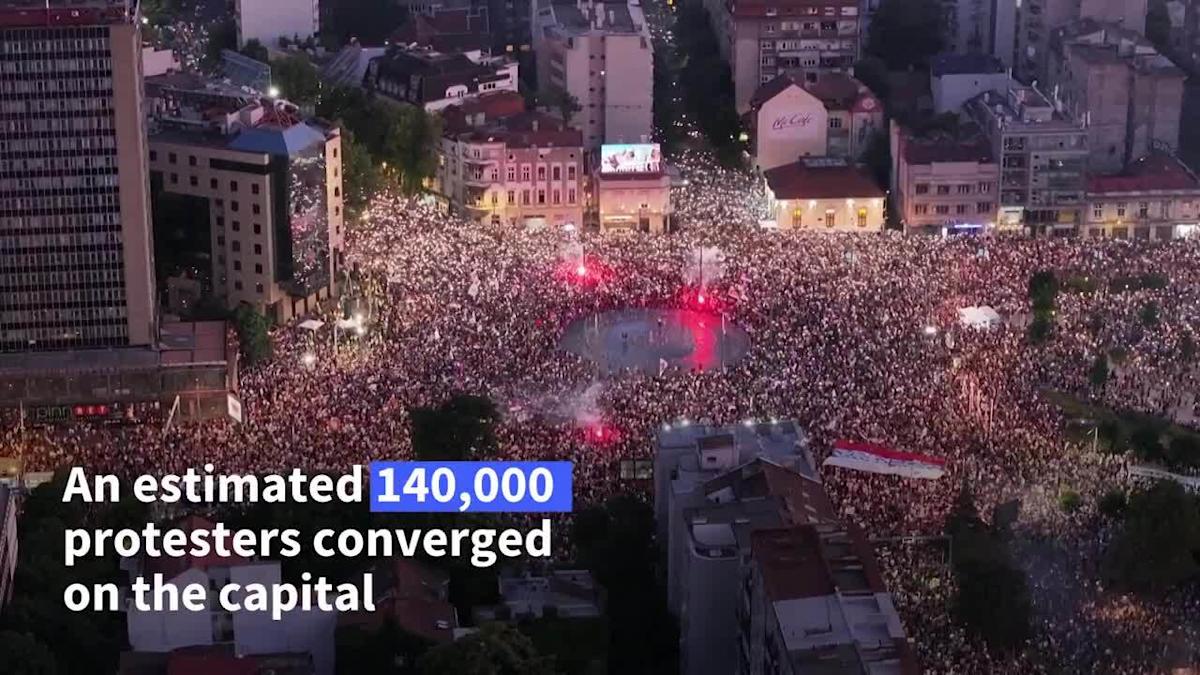The European Union on Thursday strongly condemned “acts of hatred and violence” in Serbia and called for calm days after a massive protest ended in clashes between police and demonstrators.
Thousands of protesters have blocked roads in Belgrade and other Serbian cities nightly, decrying alleged police brutality and mass arrests following Saturday’s anti-government rally that drew 140,000 people.
After the demonstration, riot police used tear gas and batons to disperse crowds that hurled bottles and flares, with President Aleksandar Vucic promising to arrest demonstrators involved in the violence.
Late Wednesday, riot police forcibly cleared street blockades in several cities, detaining nearly 80 people in the capital.
“We strongly condemn all acts of hate and violence. The rights of peaceful demonstration, freedom of assembly and freedom of expression are to be upheld,” the EU delegation in Serbia posted on X.
The statement said, “police action must be proportionate and respect fundamental rights.”
Serbian police have denied allegations of excessive use of force as videos on social media show clashes between police and students in front of university buildings.
The EU called for “swift, transparent and credible” investigation of brutality allegations and a guarantee of “due process” for arrested protesters.
But Serbia’s European Integration Minister Nemanja Starovic insisted that his country has “exemplified a gold standard in upholding political freedoms… by not only refraining from preventing illegal and unregistered traffic blockades but also having the police secure the participants of these unauthorised gatherings”.
“This is as far as it gets from excessive use of force, in stark contrast to how police operate in European Union member states”, the minister posted on X and attached a photo with police holding on the ground a man he said it was taken in Brussels.
– Total blockade –
Saturday’s protest was one of the largest since the collapse of a train station roof in Novi Sad in November, which killed 16 people in a tragedy widely blamed on deep-rooted corruption.
Although student-led, the protest movement has received wide support from across Serbian society.
An April poll by an expert group, who supports the student movement, suggested 59 per cent of citizens backed the movement — a figure disputed by authorities.
Grand Slam champion Novak Djokovic, while celebrating his victory over Britain’s Dan Evans at Wimbledon on Wednesday, pumped his arms — a gesture that has become a symbol of the protests.
It is the second time the Serbian tennis great, beloved in his home country, has performed the movement similar to the “Pumpaj”, which protesters enact to signify pumping up pressure on the government.
Protesters have called for early parliamentary elections, but so far, Vucic has ignored their demands.
Since Saturday, roaming student protesters have formed local blockades using mainly bins and fencing to occupy intersections and stop traffic.
Dozens have been arrested in recent weeks, with an increase in police action since Saturday’s rally.
Meanwhile, students called for a total blockade of both Belgrade and Novi Sad “over police brutality” on Friday from 7:00 and 6:00 am (0500 and 0400 GMT) respectively.
“Belgrade stops tomorrow!” they said on social media calling “citizens, bikers, (war) veterans, taxi drivers and farmers” to join them. The students, who posted the same call for Novi Sad, did not elaborate on a plan or any meeting point.
The protest movement has posed the strongest challenge so far to the populist government in its over 12 years in power.
On Sunday, Vucic declared that he would not give in to the protesters’ demands and threatened further arrests.
He made the remarks during one of his many television appearances — the latest of 220 in the first half of 2025 — where he regularly denounces protesters as “paid by foreign interests” and accuses them of trying to foment a coup.
cbo-oz-mp/ljv/giv
